- Home
- Leslie Meier
Mother's Day Murder Page 6
Mother's Day Murder Read online
Page 6
“I think you’re getting a little ahead of yourselves here. Besides, parents don’t go to the prom,” said Lucy.
You could almost see the wheels turning in Tina’s head. “But you could come to the after-prom party. We need lots of parent volunteers to help out.”
“I guess I can help,” said Lucy, thinking it would be worth losing a night’s sleep to see Sara reign as prom queen.
“Oh, good,” said Bar, making a note. “I’ll just put you down as head of the recruitment subcommittee. I know we can count on you to deliver at least four volunteers.”
“Uh, I wasn’t…,” began Lucy, shaking her head.
“I know you’ll do a great job,” said Tina, smiling brightly. “Another mochaccino?”
Lucy declined, dropping her notebook into her bag and standing up. She felt as if she’d had a narrow escape and wanted to get out while she still could.
That night, Lucy and Sara went to the Galleria to look at prom dresses. As they drove along the interstate, Lucy was tempted to ask Sara about the laxatives and diet pills Zoe had reported seeing, but decided against it. This was supposed to be a happy mother-daughter experience, and she didn’t want to spoil it. And besides, she’d seen no sign that Sara was using them.
“We don’t have to make a final decision tonight,” said Lucy, excited to see what the store was offering. “Let’s just see what’s available, what looks good.”
“Okay,” agreed Sara. “How much can I spend?”
“I saw some nice dresses advertised in the paper for under a hundred dollars.”
“Probably a come-on,” grumbled Sara. “I want to look good. This is my first prom, and I want to make a good impression. And remember, I’ll need shoes and probably a strapless bra, and I’ll have to get my hair done, and then there’s tanning. I know it’s not good for you, but everybody does it, and I don’t want to look like a ghost….”
“Maybe we can get some of that instant tanning cream instead,” suggested Lucy.
“That stuff makes you look orange,” said Sara.
Turning off at the exit, Lucy braced herself for a struggle. “Let’s pick some up and give it a try,” she said, turning off the ignition and grabbing her purse.
Once inside the big department store at the Galleria, they had no trouble finding the prom dresses, which spilled out of the juniors department in a colorful array of lace and chiffon and even crinoline.
“I don’t want to look like Scarlett O’Hara,” commented Sara, taking in a full-skirted number in hot pink.
“It is kind of overwhelming,” said Lucy, starting with the nearest rack. She flipped through one garishly colored evening gown after another, marveling at what fashion designers actually thought teenage girls should wear.
“I think I’ll try this on,” said Sara, holding up a sparkly pale pink sheath and eyeing it doubtfully. “It’s ninety-nine ninety-nine.”
“It’s pretty,” said Lucy, stopping to study a shimmery, ice blue, bias-cut satin dress. It was clearly in a different class from the other, fussy dresses. She grabbed it off the rack and followed Sara into the dressing room. “Try this one, too,” she said.
“Okay,” said Sara, disappearing behind the louvered door. Lucy leaned against the wall, waiting. Why couldn’t they put a chair or two in here? she wondered as she pressed her aching back against the wall.
“The pink didn’t fit,” said Sara, stepping out in the blue dress.
Lucy almost gasped in surprise. It fit perfectly, the satin snugly accentuating Sara’s trim figure. The color perfectly complemented her rosy coloring. With her hair simply styled, she would look like a modern-day Carole Lombard.
“Do you know how much this costs?” whispered Sara.
Lucy looked at the tag, which read $299.99. A penny short of three hundred dollars. She’d never spent that much on a dress for herself, much less for one of her daughters.
“No matter,” said Lucy, throwing thrift to the wind, picturing Sara in her prom queen crown. “In that dress, you’ll be the prettiest girl at the prom!”
Chapter Six
Lucy was tired on Friday morning. It had been a later than usual night, thanks to the shopping trip to the Galleria, but definitely worthwhile, even if it meant she’d have to struggle to get through the day. At least that was what Lucy told herself as she poured herself a third cup of coffee from the pot in the office. The dress had been a real find—though expensive—and it suited Sara perfectly, magically mixing sweet youth with a soupçon of sophistication.
“Soupçon of sophistication? What on earth does that mean?” demanded Phyllis when Lucy tried to describe the dress to her.
“Well, it looks classy, not slutty,” said Lucy. “It shows off her figure, but it’s not too low cut or anything like that. It’s really lovely.”
Phyllis humphed. “This is the beginning,” she warned. “You better watch out she doesn’t turn out like Elfrida. She got pregnant at her prom.”
Lucy considered Elfrida, Phyllis’s notorious cousin. With six children and numerous marriages on her résumé, she was hardly a role model for any teenage girl.
“Well, I don’t think Sara is ready for that,” said Lucy. “And now those boozy after-prom parties in motel rooms are a thing of the past. The party Bar and Tina are organizing is going to be very well chaperoned, because I’m in charge of recruiting chaperones. In fact, I’ll be there myself.”
“Lucky you,” said Phyllis, turning the charm on for the letter carrier, Wilf Lundgren, who handed her a thick bundle of letters fastened with an industrial-strength rubber band. “Thanks so much,” she said, giving him a big smile.
“It’s always a pleasure to see you,” he said, smiling back. “You really brighten my morning.”
Phyllis simpered and batted her eyelashes. “I bet you say that to all the girls,” she said.
“No, not at all,” said Wilf, taking a deep breath and plunging in. “You’re special, Phyllis. What say we get together for a bite after work?”
“That would be lovely,” said Phyllis, with a big smile. “What time?”
“I’ll come by your house at six. Is that okay?”
“I’ll be looking forward to it,” she replied, with a twinkle in her eye.
Lucy was amazed. “Since when have you been sweet on Wilf?” she asked when he had gone.
“I’ve had my eye on him for a while,” said Phyllis, sorting through the letters. “His wife died about six months ago, and he gave her such a beautiful funeral—the casket was covered with tons and tons of pale pink roses—and at the time I thought he must be a real romantic at heart.”
Lucy remembered how Wilf had come to her rescue years ago, when she was new to town and the lights had gone out in their house. Wilf had gone down into the cellar and fixed the problem. “There is something of the knight in shining armor about him,” said Lucy.
“Exactly,” said Phyllis, handing her a press release accompanied by a photo. “Lookee here. This is one lady who doesn’t look like she needs a knight to rescue her.”
It was a photo of Bar Hume, dressed in shooting gear, complete with goggles and ear protectors and an ammo vest, pointing a handgun at a target in the shape of a person. A cluster of holes indicated that if the target had been an actual person, it would be a very dead person, having been shot in the heart numerous times.
“Goodness,” said Lucy, wondering if Bar had imagined the target was Tina Nowak, just as she’d said at the brunch. “It says here she’s been chosen Gun Woman of the Year by the Maine Gun and Rifle Association.”
“Well, goody for her,” said Phyllis, taking a good look at the photo. “All I’ve got to say is it’s a good thing she’s married, because that getup is not the sort of thing men find attractive.”
Lucy considered. “I dunno. Bart seems pretty keen on her. Maybe he has a thing for women in goggles.”
“Goggles, a big maybe. Guns, no. Absolutely not. Call me old fashioned, but I don’t think there’s a place for guns in
a romantic relationship. Roses, yes. Chocolates, yes. Champagne, yes. Guns, no.”
“I think that’s good advice. If everybody followed it, we’d have a lot less domestic violence to report in the paper.”
“What’s this?” demanded Ted, who had yanked the door open and set the little bell jangling. He was practically salivating. “A tragic domestic assault?”
“Not yet,” said Lucy, showing him the photo. “But I think we should all keep our heads down now that we have the Gun Woman of the Year living right here in town.”
Ted grimaced, studying the photo. “Better be careful what you write about her in that story,” he warned Lucy. “Meanwhile, I’ll put in an order for that body armor you requested.”
“It won’t be necessary,” said Lucy, waving the press release at him. “It says right here that Bar ‘exemplifies the highest standards of gun safety and responsible gun ownership, while exercising her constitutional right to bear arms to defend herself, her family, and her country.’”
“I’m sure she does,” said Ted, “but I’m not going to go knocking on her door at night, that’s for sure.”
“I guess that’s the point,” said Lucy, who was on the second page of the press release. “She’s letting everyone know she’s no helpless victim like poor Corinne. She’s even planning to teach a self-defense class for women in the adult ed program.”
“Oh, that reminds me,” said Ted, seating himself at his desk and switching on his computer. “There’s a lot of talk that the cops are following a hot lead in the Appleton case. Maybe you can call some of your contacts and find out what’s happening?”
“I’ll try,” said Lucy, “but don’t expect much.”
“I’ve got confidence in you, Lucy,” insisted Ted. “If anybody can get them to talk, it’s you.”
Lucy suspected Ted was being sarcastic. She didn’t have especially good relationships with the local cops. On the contrary, she knew they regarded her as a thorn in their sides, always poking her nose in where it wasn’t wanted. She decided to begin with Officer Barney Culpepper, the one cop who was an old friend, dating back to the days when their boys were Cub Scouts and they both served on the Pack Committee. But since those days were long gone, she didn’t expect much. Nowadays their relationship was primarily professional. Barney was the community outreach officer and spent a lot of time speaking to clubs and school groups about safety. No matter if it was stranger danger at Halloween, warnings about fireworks on the Fourth of July, or the rules of the road for bicyclists, Barney was your man. What he didn’t know much about was the status of ongoing investigations of serious crimes.
“Gee, Lucy, I wish I could help,” he said, “but right now I’ve been focusing on reminding people not to leave valuable stuff in unlocked cars. Now that the weather’s warmer, they’ll go off and leave video cameras, laptops, cell phones, even purses, right there for anybody to take. And then they’re all upset when they get back to the car and find they’ve been robbed.”
People sure can be foolish, thought Lucy, who knew she was guilty of leaving things in her car. She never thought to lock it, either. In fact, hardly anyone in town even bothered to lock their houses.
“They should at least put valuables in the trunk, where they’re out of sight,” he continued.
“Right,” said Lucy, who drove a Subaru station wagon with no trunk at all. The car did have a sliding screen, but she never used it, figuring it would tip off a thief to the presence of something valuable. “I wasn’t looking for specifics, you know. I just wondered if you might’ve heard anything at the station that might mean they’re close to making an arrest or something.”
“Nope. Not a word, not a peep. The boys from the state are running this now, and they don’t tell us anything.”
Lucy knew this was a continuing source of irritation to the town cops. She hoped her sympathetic tone would loosen his lips. “Sometimes they use you, though, don’t they? To check on the status of sex offenders, stuff like that?”
“Oh, sure, they use us, but they never tell us why,” he grumbled.
“Yeah, well, they want all the credit for themselves,” said Lucy, laying it on thick.
“You know it,” agreed Barney.
“So have they requested anything like that lately?” she persisted.
“Not from me. The only thing I got was a memo they sent to all the community outreach officers in the state to remind kids of stranger danger now that summer is coming and school will be out.”
“But there haven’t been any incidents since Corinne, have there?”
“No, that’s the problem. These guys are like time bombs. They can handle the urges for a while, but the pressure builds, and sooner or later they have to do it again. Mebbe you could put something about that in the paper, Lucy. It’s just a suggestion. I don’t mean to tell you your business, but people need to be aware that he’s still out there.”
Not exactly encouraging news, thought Lucy, thinking of Sara and Zoe. “I’ll do that, Barney. Thanks for the tip.”
“No problem,” he said, managing to sound as if he’d given her the scoop of the century.
“What was the tip?” demanded Ted, eagerly.
“Hold the presses,” said Lucy. “People need to be aware that Corinne’s abductor is still at large, and should therefore instruct their kids to exercise caution when dealing with strangers.”
“Oh,” said Ted, disappointed. “Is that all?”
“Not quite. We also need to remind people not to leave valuable articles unattended in their automobiles.”
“I suppose hurricane season is just around the corner, too,” said Ted, referring to the police department’s annual advisory.
“He forgot to mention that,” said Lucy, considering her options. She didn’t think it was worth bothering the police chief, who was new at the job and had his hands full managing the department. The state police officer in charge of the investigation, Detective Horowitz, was an old acquaintance of Lucy’s but not in a good way. She doubted he would even take her call. No, it was time to go to the top. She decided to head to the IGA.
Dot Kirwan, the head cashier, smiled as Lucy approached with a bag of premixed salad. “Don’t you love that stuff?” she asked. “If you ask me, it’s the best thing they’ve come up with since sliced bread.”
“It’s worth the price not to have to wash and dry and tear the lettuce,” said Lucy. The store was practically empty, and Dot was free to chat, which was the purpose of her visit. Lucy knew that Dot’s numerous offspring worked in the police and fire departments, and her oldest son had recently been promoted to chief.
“It’s a real time-saver, isn’t it?” said Dot, scanning the bag. “That’ll be two-fifty. It’s on sale. Two for five dollars.”
“Great,” said Lucy, opening her purse. “You know, now that the weather’s warming up and the kids are outside more, well, I can’t help but think about what happened to that poor Corinne Appleton, and I’m so worried about my girls.”
“It’s a worry, isn’t it?” agreed Dot, giving her change.
“Have you heard anything at all? Are they close to making an arrest?”
“Funny you should ask,” said Dot, settling her bottom against the cash drawer. “I’ve been over at the chief’s a lot because Bonnie had knee surgery….”
“Oh, I’m sorry to hear that,” said Lucy.
“Just minor, that arthur-scope-ic kind, where they just make a little hole and poke something in there to fix the problem, but she’s got quite an active brood there with the three boys, and she’s supposed to stay off her feet. Well, anyway, that’s beside the point, but the chief was talking at dinner last night, and he said he wouldn’t be surprised at all if they were on to something, the state police, that is, because he hasn’t heard a word from them lately.”
“Oh, really,” said Lucy, wondering where this was going.
“Really,” repeated Dot. “He says that when they clam up, it means something is up.”
“Oh,” said Lucy, getting her drift. “Loose lips sink ships, is that it?”
“You got it. They don’t want anything to mess up whatever it is they’re up to.”
“Well, let’s hope he’s right,” said Lucy, taking her bag. “I know we’ll all rest a lot easier if they catch this guy.”
“Amen,” said Dot.
Back at the Pennysaver, Lucy reported what Dot had told her and settled down to write the story about the after-prom party. As she listened to her tape recorder, she was struck by the level of hostility the two women had exhibited at the same time they’d been pretending to cooperate on a worthy project. What Lucy found most disturbing, however, was the way they’d spoken about each other’s daughter. There had been real venom in Bar’s voice when she’d asserted that although Heather and Ashley had the same grade point averages, Heather didn’t take the challenging advanced placement courses that Ashley did. Tina hadn’t responded directly, not even when Bar had praised Heather’s figure skating but also expressed concern that Heather looked as if she’d gained a few pounds and that might throw her off. She’d waited until Lucy asked if any students were involved in planning the party to mention that “of course, Heather is very involved. She’s created a text-message campaign to publicize the event, but Ashley is too busy with the tennis team and her AP courses to help.” When Bar began to bristle, she’d added, “Of course, I understand poor Ashley really has to struggle to keep her grades up.”
It struck Lucy that the sparring was almost a reflex: they simply couldn’t stop making digs at each other. And they’d gone after her, too, when they’d realized Sara posed a threat to their daughters’ popularity. It was no wonder that the girls themselves were using similar tactics; they’d learned from masters.
She was still thinking about the rivalry between the two women when she stopped on the way home to pick up a pizza for dinner. Pizza was a Friday night tradition, providing a quick supper before the evening’s activities. Sara was going to the movies with Sassie and Renee, Zoe was sleeping over at Sadie’s house, and Lucy and Bill were going to baby-sit so Molly and Toby could enjoy a quiet dinner together.

 Christmas Card Murder
Christmas Card Murder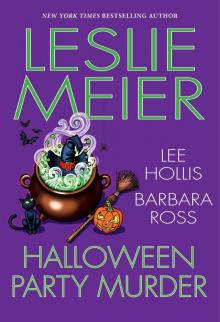 Halloween Party Murder
Halloween Party Murder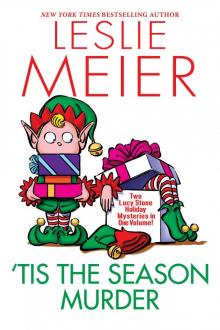 'Tis the Season Murder
'Tis the Season Murder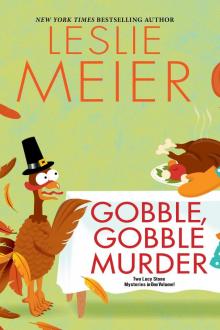 Gobble, Gobble Murder
Gobble, Gobble Murder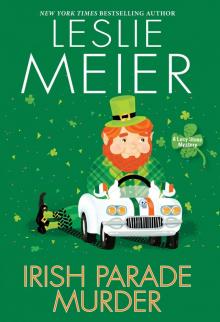 Irish Parade Murder
Irish Parade Murder Bake Sale Murder
Bake Sale Murder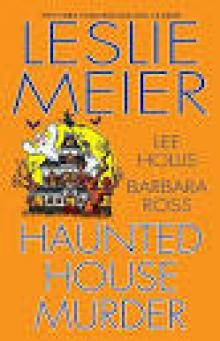 Haunted House Murder
Haunted House Murder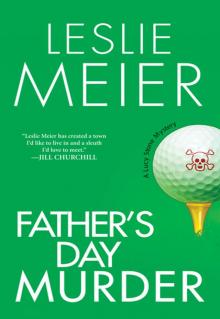 Father’s Day Murder
Father’s Day Murder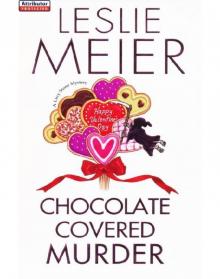 Chocolate Covered Murder
Chocolate Covered Murder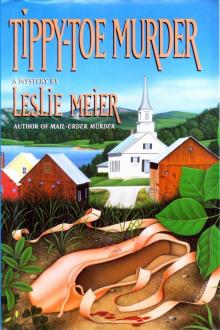 Tippy Toe Murder
Tippy Toe Murder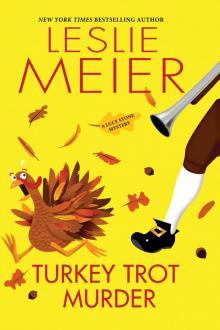 Turkey Trot Murder
Turkey Trot Murder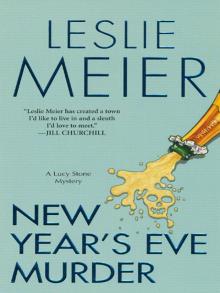 New Year's Eve Murder
New Year's Eve Murder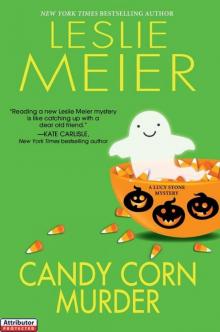 Candy Corn Murder
Candy Corn Murder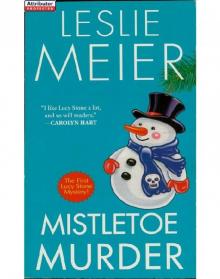 Mistletoe Murder
Mistletoe Murder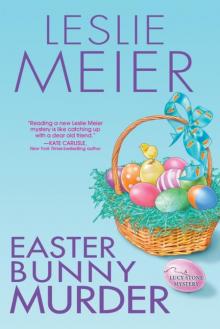 LStone 20 - Easter Bunny Murder
LStone 20 - Easter Bunny Murder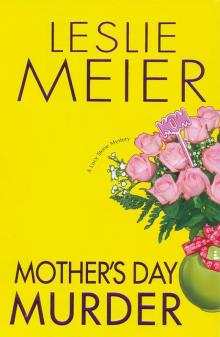 Mother's Day Murder
Mother's Day Murder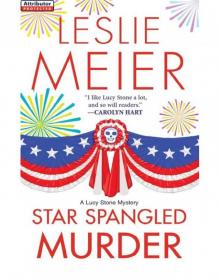 Star Spangled Murder
Star Spangled Murder Silver Anniversary Murder
Silver Anniversary Murder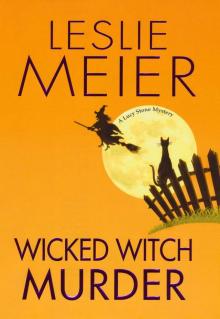 Wicked Witch Murder
Wicked Witch Murder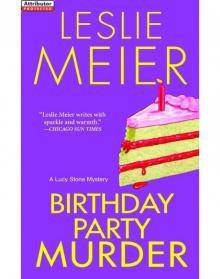 Birthday Party Murder
Birthday Party Murder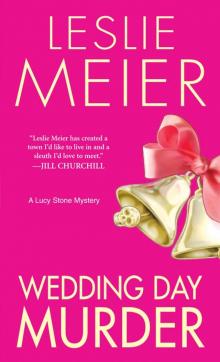 Wedding Day Murder
Wedding Day Murder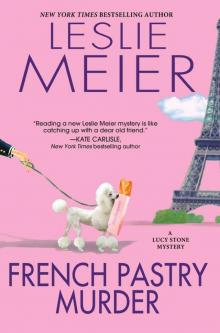 French Pastry Murder
French Pastry Murder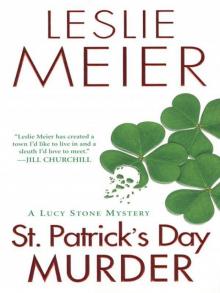 St. Patrick's Day Murder
St. Patrick's Day Murder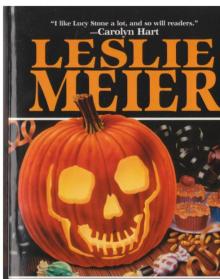 Trick or Treat Murder
Trick or Treat Murder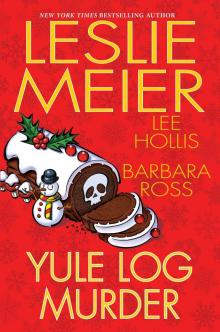 Yule Log Murder
Yule Log Murder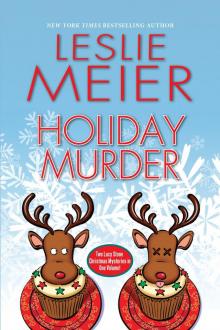 Holiday Murder
Holiday Murder British Manor Murder
British Manor Murder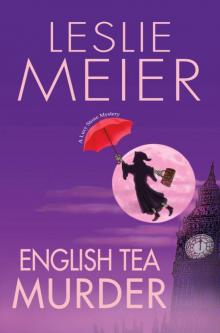 English Tea Murder
English Tea Murder